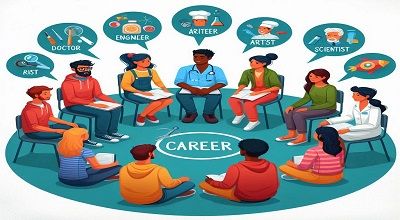Right Career Path For Students
Right Career Path For Students: Choosing the right career path is one of the most important decisions a student will make. With so many options available, narrowing down which one is the best fit can be overwhelming. A variety of factors, such as personal interests, academic strengths, market demand, and long-term goals, must be taken into account. In this post, we’ll dive into some of the best career options for students based on these factors, as well as offer guidance on how to navigate the decision-making process.
The Importance of Choosing the Right Career Path For Students
When it comes to the Right Career Path For Students, it’s not just about finding a job that pays well—it’s about finding a path that suits your personality, interests, and aspirations. A career should offer opportunities for personal growth, satisfaction, and financial stability. Making an informed decision early in life can set the stage for long-term success.
Key Factors to Consider:
- Passion and Interests: Focusing on what you enjoy can lead to greater fulfillment.
- Skillset and Strengths: Identifying your natural talents and acquired skills is crucial.
- Market Demand and Growth: It’s important to consider industries that are thriving and offer job security.
- Work-Life Balance: Some careers offer more flexibility than others.
- Income Potential: Understanding the financial prospects of different fields can guide your decision.
Top Right Career Path For Students
Based on current trends and future projections, here are some of the top career options students can explore:
a. Healthcare and Medicine
The healthcare sector is continuously growing, and with an aging population and evolving health challenges, there will always be demand for medical professionals. From doctors and nurses to medical researchers and healthcare administrators, the options are vast.
- Pros: Job stability, high-income potential, and the opportunity to make a real difference in people’s lives.
- Cons: Long educational paths, high pressure, and emotional stress.
b. Technology and IT
The tech industry is one of the fastest-growing sectors in the world. Careers in software development, cybersecurity, artificial intelligence, and data science are among the most in-demand. The tech world is not only lucrative but offers an array of possibilities for innovation.
- Pros: High demand, excellent salary packages, flexibility with remote work, and opportunities for creativity.
- Cons: Requires continuous learning and adapting to rapid changes.
c. Engineering
Engineering careers are always in demand, whether in civil, mechanical, electrical, or environmental sectors. The field offers both high earning potential and the ability to work on projects that make a tangible difference in society.
- Pros: High salaries, job security, and the opportunity to work in a wide range of industries.
- Cons: Requires a strong foundation in math and science, long working hours.
d. Business and Entrepreneurship
Business careers, including marketing, finance, and management, remain popular choices for students. Additionally, entrepreneurship is appealing to those with an innovative mindset and a desire to start their own ventures.
- Pros: High earning potential, opportunities to work in various industries, and the chance to be your own boss.
- Cons: High levels of stress, risk of failure, and financial uncertainty.
e. Arts and Creative Careers
For students with a passion for creativity, careers in design, media, writing, and the performing arts offer opportunities to express individuality and make an impact through creative work.
- Pros: Personal fulfillment, potential for fame and recognition, and flexibility.
- Cons: Competitive job market, lower starting salaries, and inconsistent income.
f. Law and Legal Professions
Becoming a lawyer or working in the legal field is another prestigious career choice. Lawyers are in demand across various sectors, from criminal law to corporate law and public service.
- Pros: High earning potential, intellectual stimulation, and opportunities for career advancement.
- Cons: Long and expensive educational journey, high stress, and emotional toll.
Key Steps for Students to Choose the Right Career Path For Students
Choosing the best career requires careful thought and planning. Here’s a step-by-step guide to help you along the way:
1: Self-Assessment
Take a deep dive into understanding your interests, strengths, and values. Tools like career aptitude tests and personality assessments (e.g., Myers-Briggs, DISC) can help narrow down career options that suit you best.
2: Research Career Options
Once you have a sense of your strengths and interests, research different career paths to understand their job roles, responsibilities, required qualifications, and growth prospects.
3: Consider Education and Training Requirements
Different careers require varying levels of education, whether it’s a bachelor’s degree, a professional certification, or advanced graduate studies. Be sure to assess the time and financial investment required for your chosen field.
4: Evaluate Job Market Trends
Keep an eye on trends in the job market. Some industries may be booming, while others are facing decline. Understanding future job growth in specific fields will help you plan for a sustainable career.
5: Seek Internships and Real-World Experience
Internships, part-time jobs, or volunteer work offer valuable hands-on experience and can give you a better understanding of what it’s like to work in your field of interest.
Career Opportunities for Students with Different Skill Sets
Different students have different strengths. Let’s look at career options based on your particular skill set:
For Creative Students
- Graphic Designer
- Writer/Journalist
- Web Developer
- Animator
- Photographer/Videographer
For Analytical Students
- Software Engineer
- Data Scientist
- Financial Analyst
- Civil Engineer
- Medical Researcher
For People-Oriented Students
- Teacher
- Psychologist
- Social Worker
- HR Specialist
- Sales Manager
The Role of Mentorship in Career Decision-Making
Finding the right mentor can significantly influence your career journey. Mentors offer guidance, provide career insights, and help you navigate challenges. Building relationships with professors, professionals in your chosen field, and industry experts can provide invaluable perspectives.
Top Trending Careers of the Future
As technology advances, new career opportunities emerge. Some of the top trending careers for the future include:
- AI and Machine Learning Specialist
- Renewable Energy Technician
- Blockchain Developer
- Sustainability Manager
- Cybersecurity Analyst
Work-Life Balance and Mental Health Considerations
It’s crucial to consider the balance between career success and mental well-being. Some careers offer flexibility, while others demand long hours and high pressure. Research the work environment and consider what will work best for you personally
Building Skills Outside of the Classroom
The development of certain soft skills, such as communication, time management, and problem-solving, is just as important as academic achievements. Participating in clubs, leadership programs, and extra-curricular activities can significantly boost your resume.
Global Career Opportunities for Students
In today’s interconnected world, many students explore international career opportunities. From studying abroad to remote work, global job markets are full of possibilities. Consider industries like international business, diplomacy, and global health for broader career horizons.
Conclusion
Choosing the right career is a personal journey that requires careful thought, planning, and dedication. The best career for a student is one that aligns with personal values, strengths, and long-term aspirations. Start early, explore your options, and don’t be afraid to seek advice from mentors or professionals in your field. By making informed decisions now, you’ll be setting yourself up for a fulfilling career.
FAQs:
How do I know what career is right for me?
Self-assessment, research, and real-world experience are key to discovering a career that suits your skills, interests, and values.
Is it okay to change careers later in life?
Yes, many people change careers as they grow and evolve. Lifelong learning and adaptability are important traits in today’s fast-changing job market.
What is the highest-paying career for students?
Careers in healthcare, technology, and business tend to offer high salaries, especially with advanced degrees and specialized training.
Do I need a university degree for a successful career?
While a degree can open doors, many successful careers do not require one. Fields like technology, entrepreneurship, and trades can be pursued through certification programs, apprenticeships, or self-learning.
How can I gain experience while still in school?
Internships, part-time jobs, volunteering, and freelance work are great ways to gain experience and build your resume while still studying.





